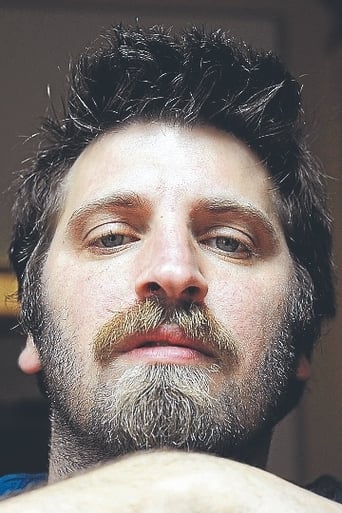Cubussoli
Very very predictable, including the post credit scene !!!
Unlimitedia
Sick Product of a Sick System
Stevecorp
Don't listen to the negative reviews
Lightdeossk
Captivating movie !
JoeytheBrit
Another reviewer's summary of this Uruguayan film is 'the psychology of failure' and I think that is probably a perfect description. This film is so subtle and understated that the vein of humour that runs through it - sardonic, dry and immaculately observed - will pass many people by. The mundanity of life, and the failure of some to see the fact that moments of happiness and relief can be wrestled from such an existence only by those with the vision and desire to do so, is reinforced by strands deliberately left untied. This film won't be for all tastes, but for those with the patience to watch beyond a slow (but necessarily so) opening act, it will prove to be a film worth watching.
Edi_Drums
Jacobo rolls up the shutter. He starts up the machines. Marta has cigarette breaks. The other girls natter at lunch-time. Marta checks their bags at home-time... From the very start of the film, the repetition of these little factory scenarios draws in the viewer, lulling us into a sense of familiarity with the character's monotonous daily lives. Shown once, it would make mundane footage, but the scenes familiarise and soon endear the viewer through their repetition. Over years and years, such a lifestyle can make you an extension of the very machines you work.It is remarkable how the film remains lightly humorous in spite of what is (arguably) an overall atmosphere of drabness and gloom. The said gloom is cast, and held fast, by Jacobo, despite Herman's perkiness and enthusiasm. Is the latter's arrival from Brazil a pleasant antidote to the glum life chosen by Jacobo (and undergone by Marta)? Does Herman's optimism, and their trip to the clapped out resort of Piriapolis, succeed in bringing some variation and - dare I say it - PLEASURE into their lives? The answer to these questions depends on your point of view. Marta, I would say, certainly enters into the spirit of the holiday, warming to Herman as she gains confidence. Don Jacobo? Barely! An example of this is when Herman admires the 'thumbs-up' magnet off the fridge; Jacobo puts it back thumbs down!The absence of music gives the everyday household sounds more relevance, as well as complimenting the domestic comedy. This disciplined economy of sound gives the music much more impact when we do hear it, as in Jacobo's big moment at the roulette wheel. (This is, incidentally, the first time in the film that he displays any hint of a smile.)Bathroom sketches involving Don Jacobo and Marta are particularly observantly delivered. He walks in on her in the bathroom; she flushes the toilet out of utter boredom at Piriapolis; he sits on the toilet to count winnings; she puts paper over a public toilet seat. We are charmed and amused to have a window onto the very private lives of these two colleagues, now acting as a couple but both reluctant and unfamiliar with married life.The late mother's honour ceremony is given a single short scene but is preceded by Herman's Jewish joke, revealing him as a self-mocking character. Neither does Don Jacobo display the stereo-typical miserly traits associated with Jews in past times: he is no 'Harpagon' with his roulette winnings, taking a small amount for himself and gifting the rest to Marta.I am disappointed by Herman's over-long karaoke scene, the poor sequencing of the football match, and the clumsy non-native subtitling ('Soap is at your discretion, señora' - a literal translation from the Spanish). On the other hand, symmetrical 'plans fixes' (fixed shots) occurring throughout – the factory front, the air hockey table, a steaming swimming pool – are very pleasing to the eye.An endearing, self-contained film of subtle humour, with a modest and unpretentious ending, superbly fitting.
nerednos-1
Yes zeidinho, you're right, it is an extremely slow movie and no, you're wrong, because it is a beauty as well. Every time you expect something to happen (which is not so often) it does not. And when you do not it does, but so casually and so not emphasized that you could very well miss it. In this respect the film is very surprising because, in contrast with its contents, the film itself does not follow the familiar patterns of storytelling. The acting is very small and very effective. The repetitive patterns (does your life change dramatically, every day?) are as painful as they are familiar. The language of images is very smart, no need to explain much. I laughed sometimes, I moaned more often and I liked it very much.
danielhsf
Much nothing ever happens in your life.You go through the routine of sleeping and waking at the same times, travelling to work on the public bus, spending your day at your job which doesn't give you any kind of immediate remuneration. Your mind idles off to whether the money for the job is worth spending your life on, then you take the public bus home again, looking out at the sights you are used to, listening to the music you feel the most comfortable in. And usually on this bus ride home, most of the angst you feel in the morning is replaced by a irrepressible fatigue that tells you honestly that life is not just about chasing pipe dreams; life is also about going through it as best you can and surviving.And as this goes on you get used to not expecting much out of life, not expecting much out of relationships, because that's the easiest way to be, just being. There is not much need to expand, really. There is not much need to feel the crests and falls of emotions. There is not much need to continue seeking, to continue dreaming, to continue hoping. And this is by no way any mistake; this is only part of the process of going through life, getting eased into it to not allow yourself any more anger that comes from lost hopes. Soon, as you get settled into your groove, you don't find going through the same days mundane anymore. You don't question what is expected of you out of life. You don't feel the need to keep expanding and expanding anymore.Once in a while, you grant yourself the pleasure of watching a picture in a darkened cinema, vicariously and voraciously living the lives of people you don't know; people whose lives seem more exciting than yours; people who experience highs and lows so much that you feel as if you are experiencing the same highs and the same lows. You sit alone in the darkened theater by yourself--you are used to being alone--while somewhere else behind you, young couples are busy checking each other's necks out with their tongues. You see this, but you don't bother. You are only interested in the people living on the screen with you, sharing with you their pains and their hopes. Then you walk out of the cinema, and your life returns back to you. You realize that it is only a short relief, before you have to face reality again, the reality that you are really not so special.Sometimes, the people in the movies cease being characters. They cease becoming people whom you fantasize about or feel pity for. Their lives suddenly seem so mundane and simple to you, and like you, they have stopped dreaming and started living in the real world. You see their everyday movements, everyday actions of endless repetition, and their normal, placid emotions that do not dare affect them in their daily lives. You grow so used to the repetitive actions, the repetitive shots, the repetitive dialogues, their every movement, that you find them so familiar. You feel as if you are sharing in some of their private lives, even if it is just make-believe. And when they discover something kind or special in their routine lives, your eyes widen and your heart fills with warmth. Mundane lives can be so beautiful too! You tell yourself secretly.And in their daily effort to live, you see how their lives subtly affect other people's lives. You see how such small acts of kindness, can gladden your heart. You see how they are used to their loneliness, and then when they find companionship, you see how gladly they hang on to them, no matter how minute their friendship may seem. You see how comical they are in their lonesome blues, and you sneak a laugh at them, knowing fully that at the same time, you are laughing at yourself and with them too. Then you find that after all, there is comedy in pathos, and there is sorrow in bliss too.At the end of the movie, the movie ends and the characters fade away into the blackness of the screen and the dark recesses of your memories. And suddenly you miss the repetition that bored you earlier, the simple mundaneness that was conveyed so simply. As you walk out of the cinema and see people walking out together with you, you feel more alone than ever before, as you're deprived of your newfound friends that you have fallen in love with in that short span of 95 minutes; like when you get used to being with other people, being lonesome again suddenly seems so difficult. And as you sit at the back of the cab on your way home, you feel that you've lost something special, even if that specialness came from make-believe situations, and a tear runs slowly down your cheek.






